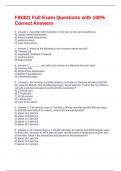FIN301 Full Exam Questions with 100%
Correct Answers
b - Answer-1. Securities with maturities of one year or less are classified as
A) capital market instruments.
B) money market instruments.
C) preferred stock.
D) none of the above
c - Answer-2. Which of the following is not a money market security?
A) Treasury bill
B) negotiable certificate of deposit
C) common stock
D) federal funds
a - Answer-3. ________ are sold at an auction at a discount from par value.
A) Treasury bills
B) Repurchase agreements
C) Banker's acceptances
D) Commercial paper
d - Answer-4. Jarrod King, a private investor, purchases a Treasury bill with a $10,000
par value for $9,645. One hundred days later, Jarrod sells the T-bill for $9,719. What is
Jarrod's expected annualized yield from this transaction?
A) 13.43 percent
B) 2.78 percent
C) 10.55 percent
D) 2.80 percent
E) none of the above
b - Answer-5. If an investor buys a T bill with a 90 day maturity and $50,000 par value
for $48,500 and holds it to maturity, what is the annualized yield?
A) about 13.4 percent
B) about 12.5 percent
C) about 11.3 percent
D) about 11.6 percent
E) about 10.7 percent
b - Answer-6. An investor buys a T bill with 180 days to maturity and $250,000 par value
for $242,000. He plans to sell it after 60 days, and forecasts a selling price of $247,000
at that time. What is the annualized yield based on this expectation?
A) about 10.1 percent
B) about 12.6 percent
C) about 11.4 percent
,D) about 13.5 percent
E) about 14.3 percent
c - Answer-7. Assume investors require a 5 percent annualized return on a six-month T-
bill with a par value of $10,000. The price investors would be willing to pay is
$________.
A) 10,000
B) 9,524
C) 9,756
D) none of the above
d - Answer-8. A newly issued T bill with a $10,000 par value sells for $9,750, and has a
90 day maturity. What is the discount?
A) 10.26 percent
B) 0.26 percent
C) $2,500
D) 10.00 percent
E) 11.00 percent
a - Answer-9. Large corporations typically make ___________ bids for T-bills so they
can purchase larger amounts.
A) competitive
B) noncompetitive
C) very small
D) none of the above
b - Answer-10. At any given time, the yield on commercial paper is ______ the yield on
a T bill with the same maturity.
A) slightly less than
B) slightly higher than
C) equal to
D) A and B both occur with about equal frequency
b - Answer-11. T bills and commercial paper are sold
A) with a stated coupon rate.
B) at a discount from par value.
C) at a premium about par value.
D) A and C
E) none of the above
c - Answer-12. ___________ is a short-term debt instrument issued only be well-known,
creditworthy firms and is normally issued to provide liquidity or finance a firm's
investment in inventory and accounts receivable.
A) A banker's acceptance
B) A repurchase agreement
C) Commercial paper
,D) A Treasury bill
b - Answer-13. Commercial paper has a maximum maturity of _______days.
A) 45
B) 270
C) 360
D) none of the above
d - Answer-14. An investor buys commercial paper with a 60 day maturity for $985,000.
Par value is $1,000,000, and the investor holds it to maturity. What is the annualized
yield?
A) 8.62 percent
B) 8.78 percent
C) 8.90 percent
D) 9.14 percent
E) 9.00 percent
a - Answer-15. A firm plans to issue 30 day commercial paper for $9,900,000. Par value
is $10,000,000. What is the firm's cost of borrowing?
A) 12.12 percent
B) 11.11 percent
C) 13.00 percent
D) 14.08 percent
E) 15.25 percent
d - Answer-16. When firms sell commercial paper at a ______ price than they projected,
their cost of raising funds is ______ than projected.
A) higher; higher
B) lower; lower
C) A and B
D) none of the above
e - Answer-17. Which of the following is not a money market instrument?
A) banker's acceptance
B) commercial paper
C) negotiable CDs
D) repurchase agreements
E) all of the above are money market instruments
c - Answer-18. A repurchase agreement calls for an investor to buy secur¬ities for
$4,925,000 and sell them back in 60 days for $5,000,000. What is the yield?
A) 9.43 percent
B) 9.28 percent
C) 9.14 percent
D) 9.00 percent
, a - Answer-19. The federal funds market allows depository institutions to borrow
A) short term funds from each other.
B) short term funds from the Treasury.
C) long term funds from each other.
D) long term funds from the Federal Reserve.
E) B and D
c - Answer-20. When a bank guarantees a future payment to a firm, the financial
instrument used is called
A) a repurchase agreement.
B) a negotiable CD.
C) a banker's acceptance.
D) commercial paper
a - Answer-21. Which of the following instruments has a highly active secondary
market?
A) banker's acceptances
B) commercial paper
C) federal funds
D) repurchase agreements
a - Answer-22. Which of the following is true of money market instruments?
A) Their yields are highly correlated over time.
B) They typically sell for par value when they are initi¬ally issued (especially T bills and
commercial paper).
C) Treasury bills have the highest yield.
D) They all make periodic coupon (interest) pay¬ments.
E) A and B
b - Answer-23. An investor purchased an NCD a year ago in the secondary market for
$980,000. He redeems it today and receives $1,000,000. He also receives interest of
$30,000. The investor's annualized yield on this investment is
A) 2.0 percent.
B) 5.10 percent.
C) 5.00 percent.
D) 2.04 percent.
a - Answer-24. An investor initially purchased securities at a price of $9,923,418, with
an agreement to sell them back at a price of $10,000,000 at the end of a 90-day period.
The repo rate is ________ percent.
A) 3.10
B) 0.77
C) 1.00
D) none of the above




